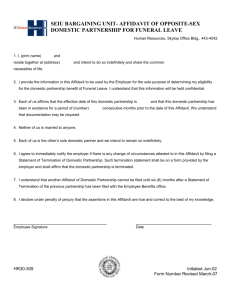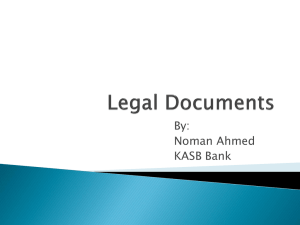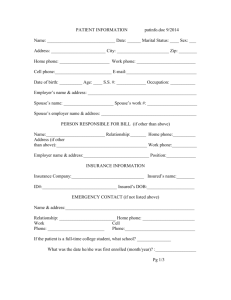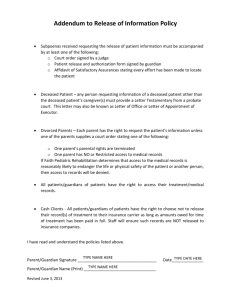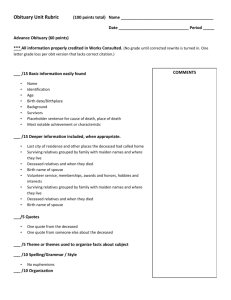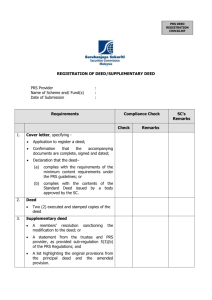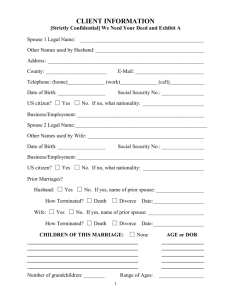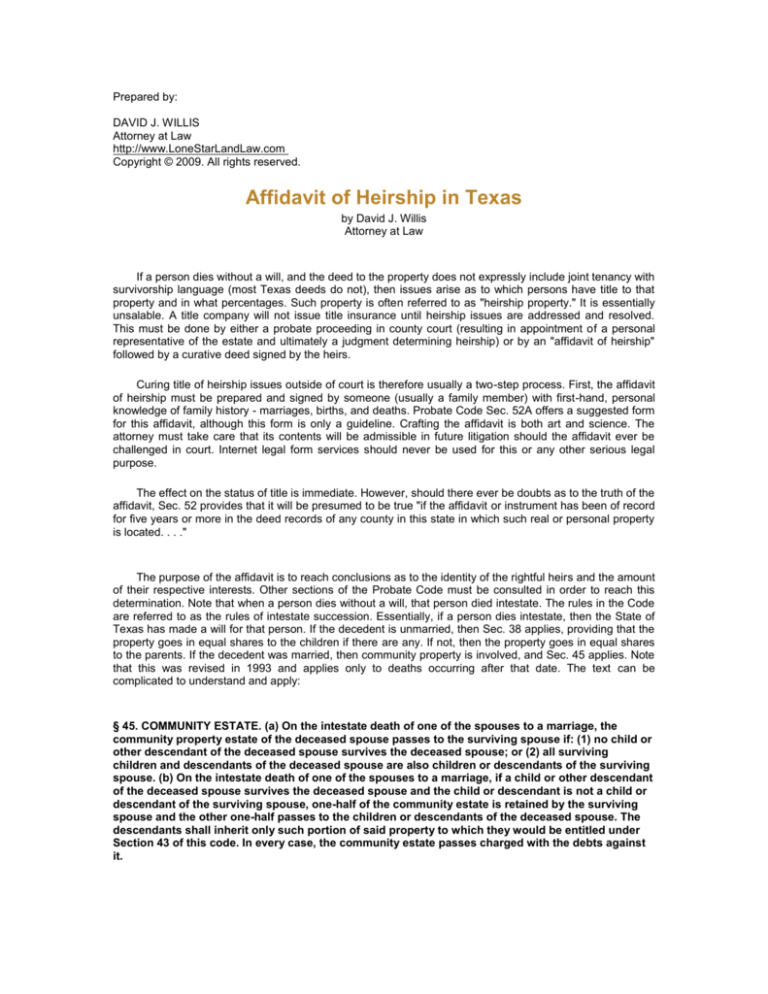
Prepared by:
DAVID J. WILLIS
Attorney at Law
http://www.LoneStarLandLaw.com
Copyright © 2009. All rights reserved.
Affidavit of Heirship in Texas
by David J. Willis
Attorney at Law
If a person dies without a will, and the deed to the property does not expressly include joint tenancy with
survivorship language (most Texas deeds do not), then issues arise as to which persons have title to that
property and in what percentages. Such property is often referred to as "heirship property." It is essentially
unsalable. A title company will not issue title insurance until heirship issues are addressed and resolved.
This must be done by either a probate proceeding in county court (resulting in appointment of a personal
representative of the estate and ultimately a judgment determining heirship) or by an "affidavit of heirship"
followed by a curative deed signed by the heirs.
Curing title of heirship issues outside of court is therefore usually a two-step process. First, the affidavit
of heirship must be prepared and signed by someone (usually a family member) with first-hand, personal
knowledge of family history - marriages, births, and deaths. Probate Code Sec. 52A offers a suggested form
for this affidavit, although this form is only a guideline. Crafting the affidavit is both art and science. The
attorney must take care that its contents will be admissible in future litigation should the affidavit ever be
challenged in court. Internet legal form services should never be used for this or any other serious legal
purpose.
The effect on the status of title is immediate. However, should there ever be doubts as to the truth of the
affidavit, Sec. 52 provides that it will be presumed to be true "if the affidavit or instrument has been of record
for five years or more in the deed records of any county in this state in which such real or personal property
is located. . . ."
The purpose of the affidavit is to reach conclusions as to the identity of the rightful heirs and the amount
of their respective interests. Other sections of the Probate Code must be consulted in order to reach this
determination. Note that when a person dies without a will, that person died intestate. The rules in the Code
are referred to as the rules of intestate succession. Essentially, if a person dies intestate, then the State of
Texas has made a will for that person. If the decedent is unmarried, then Sec. 38 applies, providing that the
property goes in equal shares to the children if there are any. If not, then the property goes in equal shares
to the parents. If the decedent was married, then community property is involved, and Sec. 45 applies. Note
that this was revised in 1993 and applies only to deaths occurring after that date. The text can be
complicated to understand and apply:
§ 45. COMMUNITY ESTATE. (a) On the intestate death of one of the spouses to a marriage, the
community property estate of the deceased spouse passes to the surviving spouse if: (1) no child or
other descendant of the deceased spouse survives the deceased spouse; or (2) all surviving
children and descendants of the deceased spouse are also children or descendants of the surviving
spouse. (b) On the intestate death of one of the spouses to a marriage, if a child or other descendant
of the deceased spouse survives the deceased spouse and the child or descendant is not a child or
descendant of the surviving spouse, one-half of the community estate is retained by the surviving
spouse and the other one-half passes to the children or descendants of the deceased spouse. The
descendants shall inherit only such portion of said property to which they would be entitled under
Section 43 of this code. In every case, the community estate passes charged with the debts against
it.
The second step in the process, after preparation of the heirship affidavit, is a deed (referred to by this
writer as a "curative deed") that consolidates title into a single heir who may then keep the property or sell it.
This should be accomplished using a special warranty deed or deed without warranties, but not a quitclaim
deed, which title companies generally do not insure. All heirs named in the affidavit (or their legal guardians)
must sign. Both documents are filed in the real property records in the county in which the property is
located - the affidavit first, and then the deed.
In many cases, the heirs may be spread over the country and may have long since lost touch. Some
heirs may not sign unless they are paid to do so - and financial issues between family members can get
ugly. Clients are often disappointed when they discover how difficult and expensive the process can be.
Here is a true story:
"My mother died six months ago, and I need to get a deed to her ranch," says the client. "How much do
you charge for preparing a deed?"
An attorney needs to know a great deal more information before he can answer, starting with asking,
"Did she die with a will?" The client admits that there was no will, then goes on to ask, "But I can still get my
deed can't I?"
More questions from the attorney reveal more information about the family. The mother was a widow.
The father died two years earlier - also without a will. In addition, it turns out that the client has several
siblings, one of whom was from the father's prior marriage. Another has dropped out of sight and has not
been heard from in years. There are rumors he is homeless on the streets of Los Angeles. Another sibling
recently passed away, leaving two small children. Also, the youngest sibling was living with Mom and taking
care of her at the time of Mom's death, and she continues to occupy the property, now claiming it as her
homestead. She contends that Mom promised that the house would be hers in exchange for care during her
final illness.
The attorney is forced to give the client bad news. The client is not going to get his deed, at least not
until heirship issues are straightened out, beginning with the father and who was entitled to inherit from him,
and then moving on to the mother and her heirs.
The client is suspicious. He says, "Look, your secretary told me that the fee for a deed is $225. It
sounds like you're just trying to charge me more money. I'm the oldest, and I was always told the property
would be mine one day. I want my deed now!" Unfortunately, that is just not possible given the facts of this
case. The attorney is not a miracle worker. Because of the complexities of the case and the necessity of
attempting to contact, negotiate with, and perhaps buy out other surviving heirs who also might want the
property, legal fees and expenses could reach into the thousands of dollars - with no guarantee of success.
Other attorneys could become involved. The case might have to be decided in court and take years to
resolve
.
The foregoing is an example of a worst-case scenario, but it happens. On the other hand, it may be
possible to get the job done in a few days so long as everyone involved is agreeable and cooperates. In
some cases, heirs may have attempted to resolve heirship issues on their own, without an attorney, and
have done so incorrectly. Affidavits and deeds may then have to be re-prepared and refiled. It is therefore
difficult for an attorney to quote a flat fee for his services. Legal fees in this office for curing title begin at
$750 (plus recording costs).
DISCLAIMER
Information in this article is proved for general informational and educational purposes only and is not
offered as legal advice upon which anyone may rely. Legal counsel relating to your individual needs and
circumstances is advisable before taking any action that has legal consequences. Consult your tax advisor
as well. This firm does not represent you unless and until it is expressly retained in writing to do so.
Copyright © 2009 by David J. Willis. David J. Willis is board certified in both residential and commercial
real estate law by the Texas Board of Legal Specialization. More information is available at his web
site,http://www.LoneStarLandLaw.com.

